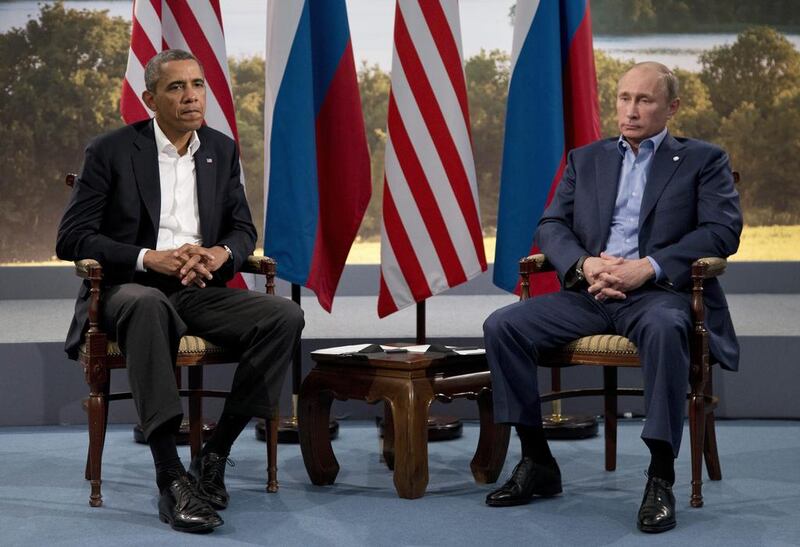Those in Washington nostalgic for the heady days of empire will proclaim 2014 as the year the Cold War resumed: Russia annexed Crimea and backed a secessionist movement in eastern Ukraine after its ally in Kiev was overthrown by a western-backed rebellion. Nato sounded dire warnings and its members imposed sanctions on Russia as the rhetoric on both sides turned decidedly old-school. US leaders berated Russian expansionism, while in Moscow the talk was about resisting Nato’s steady encirclement.
But the renewed US-Russia standoff is nothing remotely like the Cold War.
Geopolitical contests between Washington and Moscow dominated international affairs for the second half of the 20th century. The current Nato-Russia standoff, by contrast, is a petty regional conflict with scant effect on the rest of the world. As the Nato-Russia dispute simmered, the world pretty much got on with its own business – messy and chaotic as that business often was.
Sure, Moscow ended the year in financial turmoil as its currency plummeted, but that was largely a result of the global oil price being cut in half in a matter of six months.
And the fact that Moscow turned not to the International Monetary Fund when it needed to prop up the rouble but instead to China was a sign of just how much the global balance of economic power has changed.
Curiously enough, Barack Obama ended 2014 by finally telling Americans that more than a half-century of US- Cuba policy had failed, resuming diplomatic ties and easing the embargo.
Mr Obama’s decision is historic in US domestic politics, but it simply brings America into line with the rest of the world. The move won universal praise in Latin America, where governments have long maintained normal relations with Cuba and pressed the US to follow suit. Far from the US “backyard” of yore, Latin America today does more business with China, which has broken ground on an epic construction project to open a new transcontinental canal through Nicaragua.
American power was also conspicuously absent in the Middle East. ISIL emerged in the vacuum of crumbling state power in Iraq and Syria, and while the US launched air strikes to contain the movement, Mr Obama’s “coalition” against the movement is comprised largely of groups for whom ISIL is of secondary importance to their primary strategic interests, which are often in competition.
ISIL may be put on the back foot by air strikes and internal discord, but it’s likely to remain a factor in the year ahead.
Elsewhere in the region, all pretence that the Israeli-Palestinian conflict will be resolved in a US-mediated negotiations process has finally collapsed, leaving the Europeans to muster diplomatic pressure – and the Palestinians to figure out a new strategy.
US negotiations with Iran failed to conclude a long-term agreement, but have nonetheless created a framework that caps Iran’s nuclear work and creates a basis for stabilising that particular standoff. One indicator of that stability may be that the question of war or peace with Iran is no longer front-page news in the US.
In near-parody of Cold War era posturing, many thousands of Americans flocked to cinemas over the holiday season to watch a puerile Hollywood comedy about North Korea after it was alleged that Pyongyang was responsible for hacking Sony Pictures and warning the company not to release the movie. “Freedom” as used in the Cold War sense now means sitting through a Seth Rogen movie.
The Sony hack was branded an attack on US national security, and it certainly revealed an astonishing level of integration between Hollywood studios and Washington’s security establishment. But the integration of corporate and state power revealed in the Sony hack is a trend likely to deepen in the coming year and beyond. Who knows what might have been revealed by a hack of the email correspondence between government officials and those in charge of America’s too-big-to-fail banks?
Those banks did little to disguise their power in the budget passed by a divided and dysfunctional Congress in December, which included a provision eliminating restrictions on certain speculative investments imposed after the 2008 financial meltdown.
Wavering Democrats received personal phone calls from Mr Obama and Jamie Dimon, JP Morgan Chase’s CEO, to encourage them to vote for the measure.
The power of bankers – or, at least, of the capital of which they are simply the stewards – is intimately connected to the growing social inequality that was a theme not only of street protests and papal admonitions in 2014, but of anxious conversations at the World Economic Forum and the International Monetary Fund.
Thomas Piketty’s magisterial scholarly study of inequality became an improbable best-seller in a year when those in power recognised it as a major drag on economic growth. But the influence of bankers and billionaire corporate donors in shaping the political agenda in the US and elsewhere diminishes the likelihood of governments tackling inequality.
The ownership of the political system by a narrow set of corporate interests makes it inevitable that 2015 will see more street protests around the world on issues ranging from austerity and social inequality to climate change and racial injustice. Those who are on the streets are voting with their feet against political systems that have become more responsive to donor money than they are to the concerns of the citizenry.
Many of the key problems dominating the international agenda in 2014 were systemic and they’re unlikely to be resolved in 2015. Expect another interesting year.
Tony Karon teaches in the graduate programme at the New School in New York





